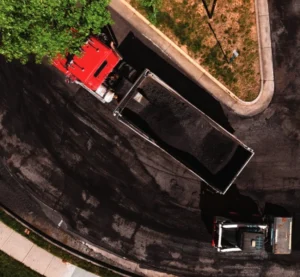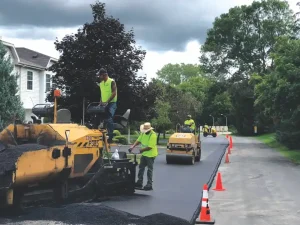The global sustainability trends, coupled with the frequency and severity of human-induced disasters, have skyrocketed demand for eco-friendly infrastructure. The demand for pavements with substantial environmental benefits, especially in urban settings, led to the rapid rise of permeable parking lot designs. They are considered the safer, more resilient, efficient, and environmentally friendly option. Choosing a permeable parking lot means doing more than just protecting the planet. Read on to learn more.
Table of Contents
Permeable Parking Lot
A permeable or pervious parking lot is a paved surface with porous materials to allow water to infiltrate through the surface and into the ground. It is an eco-friendly pavement solution popular in urban settings where managing stormwater runoff and mitigating flooding is imperative. Though built with conventional materials, permeable parking lots are designed to provide more than just water capture and infiltration; they also ensure water is purified before recharging the groundwater.
Permeable parking lots come in various forms, including permeable concrete, permeable asphalt, loose gravel, porous plastic structures, concrete grid, and resin-bound paving. The design is the same regardless of the type—a porous surface where water can pass through to an underlying reservoir.
4 Reasons to Invest in a Permeable Parking Lot
1. Environmental Benefits
The environmental benefits linked to permeable parking lots are plenty and substantial. For instance, they reduce the risk of flooding during extreme precipitation events by reducing peak flows. Secondly, permeable parking lots allow for greater water uptake, purifying and returning water into local water tables that, in turn, support the ecosystem. Thirdly, permeable pavements absorb less heat than the alternatives, reducing cities’ urban heat island effect.
2. Built-In Drainage
The conventional parking lots built with impermeable materials lack effective and safe measures for stormwater management. As such, they require additional investment into drainage systems such as drainage grates, detention ponds, and sloping of the entire pavement. On the other hand, with permeable pavers, stormwater simply drains into the ground below, making permeable parking lots an eco-friendlier approach to stormwater management.
How Permeable Surfaces Provide Eco-Friendly Paving
Learn more about how permeable surfaces offer eco-friendly paving by allowing water to pass through, reducing runoff, and promoting groundwater recharge.
Read More About Permeable SurfacesGet a Quote3. Cost-Effectiveness
A permeable pavement is worth considering if you’re running on a budget. Permissive pavers cost way less than concrete or asphalt, depending on the material of choice. Also, due to built-in porosity and detention, permeable pavements have greater land savings. On top of that, a permeable parking lot will cost you significantly less in maintenance costs than alternative paving solutions. Their stormwater management properties can go a long way in reducing costly repairs associated with surface erosion.
4. Resilience and Durability
A key consideration when constructing a parking lot is meeting the established paving standards, meaning, among other factors, the surface should handle certain levels of traffic, weight, and pressure without losing its structural integrity. Permeable pavers are designed to help you build a parking lot that meets all these standards and has the durability that exceeds that of concrete or asphalt.
Bottom Line
Permeable pavers are ideal for cost-effective, durable, low-maintenance, and functional pavement with numerous environmental benefits for residential and commercial parking lots. So, consider going with permeable pavers for your next project instead of opting for the traditional asphalt or concrete parking lot. Pro Pave Inc. can help you reap the full benefits of permeable parking lots. Contact us today or call us at (703)-433-9500 to get started.




